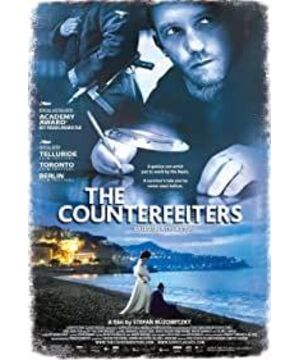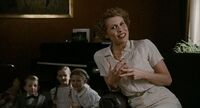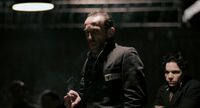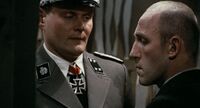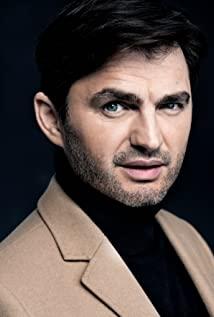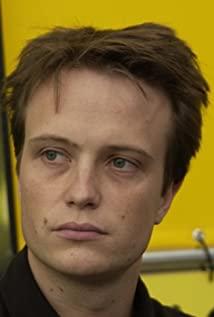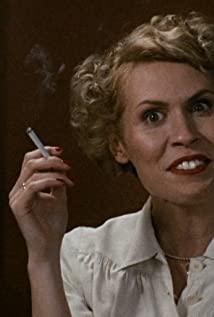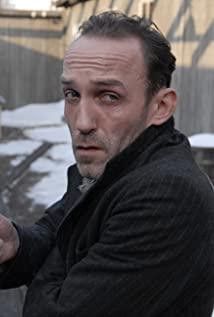Speaking of the director of "Die Fälscher", Stefan Ruzowitzky was born in Düsseldorf and moved to Austria with his parents in his early years. After graduating from the University of Vienna in drama, he began his career as a director. At the beginning of his career, he paid more attention to musicals and stage plays. After filming the first feature film "Tempo" in 1996, he began to emerge in the German film industry. This "Die Fälscher" is one of his masterpieces, and it is also his peak work at this stage. Starring Karl Markovics is an Austrian non-famous actor. Although he has not received an orthodox college education, his many years of stage career have made his performances full of life experience. In "Die Fälscher", his performance is three-pointers, and the inner activities of the characters are well expressed with facial expressions and body language. He was also nominated for an Emmy Award for Best Actor in a Foreign TV Film in 2008.
At the beginning of the film, a haggard-looking man rents a suite in a luxury hotel in Monte Carlo. Then the man appeared in the hotel casino, and the film before the table entered the plot of the theme flashback. This man was Salomon Sorowitsch, a Jew, and was the most famous counterfeit banknote manufacturing expert in Nazi Germany at that time. With his superb forgery technology, he lives very well. But the good times didn't last long. It didn't take long for him to be arrested by Friedrich Herzog of the Nazi German Guard and immediately sent to the Mauthausen concentration camp. Before long, he was transferred to Sachenhausen. At this time, Friedrich Herzog was already a major of this concentration camp, responsible for Operation Bernhard of SS ("Aktion Bernhard"). Sal, who specializes in surgery, naturally became the team leader of this operation. After Sal entered this department, his purpose was very clear-to be alive, but as the hell-like scenery around him continued to emerge, Sal also slowly changed.
In terms of the language of the screen, the straightforward narrative of the film and the flexible use of portable photography make this intuitive aesthetics create a strong sense of presence, which directly brings the viewer into the film and obtains an empathetic experience. "Die Fälscher" is not like other films about the Nazi genocide, which only uses blood and violence to accuse blood and violence. As mentioned earlier, the director showed the situation at the time with a cold perspective. But this grimness is quite powerful. For example, the execution of Jews from behind the wooden planks in the "Bernard Park". There is no intuitive picture, only gunshots, the fear of witnesses, and the consternation and sorrow of the audience. This indirect portrayal is more in-depth than direct, bloody close-up descriptions, and can resonate with viewers.
Operation Bernard was a large-scale forgery of financial products and currencies that the SS aimed to disrupt the economic system of the Allies at the time. The character Burger in the film does exist (actually the author of the original film). It was precisely because of that time that he launched a non-cooperative movement at the cost of his life that could be sacrificed at any time, which made Nazi Germany, the largest forgery plan in history, ultimately failed.
Of course, Operation Bernard is just a "prop" for the screenwriter. The topic discussed in the film has nothing to do with the action itself. In violence, in totalitarianism, in the darkness, as human beings, whether we can really retain our original humanity and dignity, this is the biggest thinking that the movie brings us. When the Jewish banker whispered to the German military officer: I have been an upright citizen all my life, and I am ashamed of the illegal deeds I am doing now, and the Nazi military officer then laughed disgracefully. This scene is full of meaning.
Evil and good seem to be opposed, but in fact they are only one step away. In the suppressed human nature, all goodness and beauty will become evil and ugly without exception. After being insulted by a German officer with urine, Sal was angry, out of dignity. However, dignity returned to power and darkness, and became so insignificant again. When Sal pointed the gun at Herzog, the film once again explained the definition of dignity with a very ironic meaning. A former Nazi officer, under the weight of life and death, the former pressurizer peeed all over the floor. In order to live, people never have dignity.
HuGo
1.14.10
Clausthal
View more about The Counterfeiters reviews


